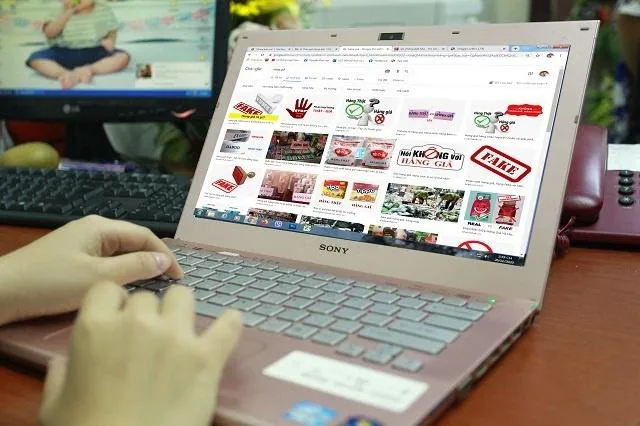Fake goods rampant in online market
Many sellers have taken advantage of online trading to sell fake or poor-quality goods.
E-commerce has been more and more popular in Viet Nam, offering opportunities for both legal and illegal traders. Many sellers have taken advantage of online trading to sell fake or poor-quality goods.
Low-quality and fake goods have been more popular online. Photo Cong Hung |
Searching through Facebook, we will easily encounter livestreams selling things from clothes, bags, cosmetics to imported food…with advertisements promising “proper quality stamps and trademark”, ”full boxed".
Though the products may be officially sold at millions of dong at stores, they may be offered online at a price dozens of times lower.
Nguyen Thu Quynh, who used to sell clothes online for a shop on Facebook said the daily task for her and her friends included cutting off Chinese brand tags from the clothes sold at the shop and replacing them with tags bearing Japanese brand names.
“A day running ads on Facebook may bring along many orders to the shop,” she said. “We, the staff, just needed to answer the phone, check orders on Facebook, and pack goods to send to customers.”
Quynh said each day they might respond to thousands of orders, which would be sent and paid by ship COD service.
“Some items can be sold 5-10 times higher than the shop’s imported price, which resulted in VND300-400 millions of profit each month for the owner,” she said.
According to a report by the Viet Nam E-Commerce Association, the growth rate of this circle this year will remain over 30 per cent with the value of over VND15 billion.
With this growth, e-commerce has been a quick and convenient way of buying, meeting all demands of customers.
One just needs to sit at home, with a laptop or smartphone, and can buy any kind of goods through such e-commerce sites like Tiki, Lazada, Sendo, and Shopee. Yet the risk of buying fake goods, illegal goods or goods at low quality is even higher.
E-commerce sites have applied various measures to protect customers’ rights. Sendo is applying AI to filter products with high risk of being fake. The e-commerce exchange is ready to join hands with concerned agencies in discovering and dealing with violators for a healthy and transparent trading environment.
Lazada keeps checking the goods carefully. As soon as some shops are discovered offering fake or low-quality goods, they will fine or close the shops’ accounts immediately.
Shopee only pays money to the sellers when customers are happy with the products. Customers can return the products within seven days if the products are not as good as they expect. Customers can even inform Shopee, concerned agencies or contributing shops on any problem.
“We often act seriously when we receive information about fake goods in Shopee,” said a representative from the exchange. “We may lock the violated product, close the account forever and report to concerned agencies.”
Applying criminal law
According to the Vietnam Market Surveillance Agency, low-quality and fake goods are available at various parts of the market, which may be carried out by online selling in both wholesale and retail, especially through recent livestream selling activities.
A representative from the agency said a key policy to prevent fake goods is that the sellers should show evidence of the products’ origins, trademarks, and invoices.
Resolution 52/2013/ND-CP should be amended soon to include the regulation requiring products’ trademark and information in e-commerce to be posted on websites and to enhance the responsibility of the e-commerce exchange’s owner.
Lawyer Nguyen Huu Toai, director of Hung Dong Law Company told Kinh te & Do thi that there should be synchronous measurements by concerned State agencies to prevent low-quality and fake goods to protect the rights of consumers.
So far, e-commerce exchanges have locked over 34,000 products by 17,000 contributing shops.
“I think Vietnamese enterprises should protect themselves by registering their trademarks and intellectual copyrights at concerned agencies,” said lawyer Bui Quang Thu, from Ha Noi Bar Association.
“Consumers should be wise enough to choose proper products,” he added.








